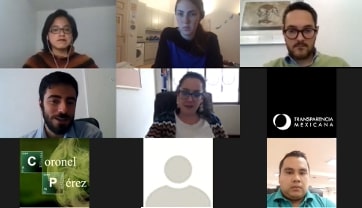17 December 2020 –
 The UNCAC Coalition hosted its first regional webinar on Strategic Litigation on Corruption in Latin America on 8 December 2020. Nearly 40 representatives from civil society organizations (CSOs) that work on transparency, anti-corruption and open government issues participated in the webinar. More than half of the participants were UNCAC Coalition members, while the rest had either applied for membership or affiliation or were considering applying. Almost every Latin American country was represented.
The UNCAC Coalition hosted its first regional webinar on Strategic Litigation on Corruption in Latin America on 8 December 2020. Nearly 40 representatives from civil society organizations (CSOs) that work on transparency, anti-corruption and open government issues participated in the webinar. More than half of the participants were UNCAC Coalition members, while the rest had either applied for membership or affiliation or were considering applying. Almost every Latin American country was represented.
This first regional webinar, labelled a conversatorio in Spanish, which roughly translates to a space for open conversation, aimed to promote cooperation between these CSOs on the subject of strategic litigation of corruption cases.
Strategic Litigation in Latin America
After a brief presentation of the UNCAC Coalition by Vienna Hub-representative Danella Newman, the Coalition’s Regional Coordinator for Latin America Iñaki Albisu Ardigó provided an overview of the current state of affairs around strategic litigation on corruption and human rights in the region and its potential as an effective instrument for change. A key message of the UNCAC Coalition representatives was that the UNCAC is an essential and underutilized legal instrument for preventing, investigating and sanctioning corruption. Representatives of four CSOs, three of them Coalition-affiliated, spoke about the most important issues surrounding strategic litigation in their countries, as well as in the region.
Jorge Cardoso from Derechos Humanos y Litigio Estratégico México, a new member of the Coalition, gave a brief overview of the issue of legal standing in cases of corruption. In Mexico, corruption cases are generally brought forward by prosecutors, with few cases being brought to the courts by victims of corruption or civil society organizations. According to current judicial practices, judges in Mexico have the power to consider if an actor is a legitimate plaintiff in a corruption case or not. Unfortunately, more than half of the cases CSOs have brought forward as plaintiff or representatives for victims of alleged corruption were rejected up front on the grounds of a lack of legitimate standing.
The second speaker, Cruz Silva, Director of the Instituto de Defensa Legal (IDL) and spokesperson for the Grupo de Trabajo contra la Corrupción, both CSOs from Peru, gave an insight into the work of legal activists in Peru in relation to corruption cases, specifically focusing on the collaborative work that emerges when lawyers, CSOs, and journalists engage with the judicial branch. Her organization IDL, for example, brings forth cases representing victims of corruption or acts as a cosigner to official corruption complaints. The Working Group against Corruption in Peru, which is a network of anti-corruption organizations, has provided legal assistance to victims of corruption in various departments of the country, and has engaged in intensive follow-up campaigns in relation to corruption cases with the help of investigative journalists.
Furthermore, Wilson Sandoval, representing UNCAC Coalition affiliated group Fundación Nacional para el Desarrollo (FUNDE), from El Salvador, laid out the process that FUNDE’s Advocacy and Legal Advice Centre (ALAC) undergoes when taking on a corruption case. He explained that the case itself, though important, is only one component of a general strategy to promote change through strategic litigation. He noted the importance of informing and updating citizens and journalists about and creating momentum around each case in order to start public conversations regarding what governing with integrity is and what it is not.
Finally, Susana Saavedra from Coalition-affiliated group Fundación Construir spoke about how CSOs advocate against corruption in Bolivia. She explained how both the UNCAC and the Inter-American Convention Against Corruption have recently proven to be effective legal tools to influence the government’s anti-corruption actions. In Bolivia, anti-corruption and human rights advocates have begun coalescing into a single force, recognizing the strong links that exist between the two fields. Ms. Saavedra closed by highlighting the importance of fighting corruption through regional networks, as they allow innovative advocacy strategies and cutting-edge ideas to flow through different social spaces, thus improving everyone’s chances of success.
These brief interventions were followed with a round of questions and comments, as well as an open discussion among the participants of the webinar. The way each organization undertakes its advocacy campaigns surrounding their legal work was of great interest. The work of other CSOs, notably UNCAC Coalition members TOJIL from Mexico and Asociación Civil por la Igualdad y la Justicia (ACIJ) from Argentina, were held up as examples of leading successful advocacy campaigns centred on strategic litigation. Nina Sibila from Fundación para el Desarrollo de Políticas Sustentables (FUNDEPS) from Argentina, and Sergio Ardaya from Fundación para el Desarrollo Participativo Comunitario (FUNDEPCO) from Bolivia, both shared their experiences working with media organizations regarding corruption, and noted the difficulty of ensuring their actions are correctly interpreted by the media and political actors.
Conclusions and way forward
The participants of the conversatorio agreed that strategic anti-corruption litigation in Latin America needs to be studied more and proposed that CSOs analyse how a legal strategy can be carried out by civil society in each country. As a follow-up to the webinar, the UNCAC Coalition will explore possible synergies with its Working Group on Victims of Corruption, which interested CSOs are welcome to join.
The webinar closed on a note of hope and excitement amongst the participants. On the eve of the International Anti-Corruption Day, many civil society representatives invited other participants to planned anti-corruption events, shared new publications that would be launched and vowed to continue the conversation on such important topics.



